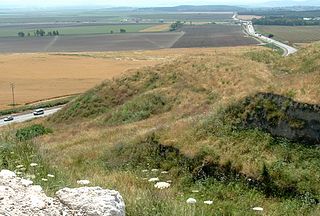The death of Josiah is reported differently in 2 Kings and 2 Chronicles. The Kings account is brief:
[WEB] 2 Kings 23 : 29 In his days Pharaoh Necoh king of Egypt went up against the king of Assyria to the river Euphrates; and king Josiah went against him; and Pharaoh Necoh killed him at Megiddo, when he had seen him. 30 His servants carried him in a chariot dead from Megiddo, and brought him to Jerusalem, and buried him in his own tomb. The people of the land took Jehoahaz the son of Josiah, and anointed him, and made him king in his father’s place.
It's a little longer in Chronicles:
[WEB] 2 Chronicles 35 : 20 After all this, when Josiah had prepared the temple, Neco king of Egypt went up to fight against Carchemish by the Euphrates, and Josiah went out against him.
21 But he sent ambassadors to him, saying, “What have I to do with you, you king of Judah? I come not against you today, but against the house with which I have war. God has commanded me to make haste. Beware that it is God who is with me, that he not destroy you.” 22 Nevertheless Josiah would not turn his face from him, but disguised himself, that he might fight with him, and didn’t listen to the words of Neco from the mouth of God, and came to fight in the valley of Megiddo. 23 The archers shot at king Josiah; and the king said to his servants, “Take me away, because I am seriously wounded!”
24 So his servants took him out of the chariot, and put him in the second chariot that he had, and brought him to Jerusalem; and he died, and was buried in the tombs of his fathers. All Judah and Jerusalem mourned for Josiah.
The slight differences in referring to Megiddo are, possibly, less significant (although this, too, can contribute to quite different accounts of Josiah's death):
This comparison highlights the key differences:
+--------------------------------+--------------------------------+ | 2 Kings 23 | 2 Chronicles 35 | +--------------------------------+--------------------------------+ | * encounters Neco | * battle with Neco | | * met at Megiddo | * engaged in valley of Megiddo | | * Josiah killed “by” Neco | * injured by Egyptian archers | | * corpse returned to Jerusalem | * returns to Jerusalem | | * buried and mourned | * dies, buried, mourned | +--------------------------------+--------------------------------+
In the Kings account, Josiah dies at Meggido having been killed by Neco, but in the Chronicles account, Josiah dies in Jerusalem as a result of injuries sustained.
There is a further complication in that the Kings account can be read as a "simple" assassination, rather than death in battle, whereas the Chronicles account is explicit in describing the injuries inflicted during battle.
So ... where did Josiah die? and how?
